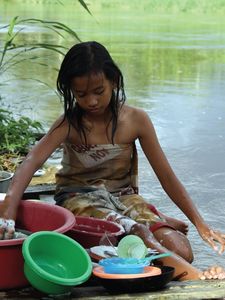 The Rambang people live in an area spread across the southeastern part of South Sumatra province. In Prabumulih City, they live scattered throughout several districts in which they are the dominant group. The Rambang people have several names, including: Rambang Dangku, Rambang Senuling, and Anak Rambang.
The Rambang people live in an area spread across the southeastern part of South Sumatra province. In Prabumulih City, they live scattered throughout several districts in which they are the dominant group. The Rambang people have several names, including: Rambang Dangku, Rambang Senuling, and Anak Rambang.
What are their lives like?
Rambang society is rich in various rituals oriented toward the natural environment. These include birth and death rituals, and Buang Juang, a farewell ceremony when one leaves the village to find work. Other rituals relate to special natural phenomena such as lunar and solar eclipses, requests for rain, earthquakes, and others. The Rambang also highly value competitions in reading the Qur’an (Islamic holy book), and the Hajj (pilgrimage to Mecca).
The Rambang people live simply. Most Rembang are farmers and rice is the main crop. They still use water buffalo to work wet rice paddies. In addition, they grow corn, peanuts, and fruit. The Rambang are sometimes referred to as orang selengek, a term referring to their unique method of preserving fish. They also make traditional items from rattan, roots, and palm leaves.
Rambang villages usually have 300-400 households. Houses are usually single-family dwellings of three or four rooms raised on stilts. The area below the house is used for storage or trade. The Rambang trace their descent through both the mother and the father. Two types of marriage arrangements are practiced: 1) payment of dowry, which establishes a couple’s residence with the groom’s family and primarily affiliates any children with the father’s line; 2) no payment of dowry, placing the groom in the bride’s household and any children in their mother’s line.
What are their beliefs?
The Rambang believe that their first leader to follow Islam was Lord Bintang Ruano. He introduced Islam to the people of Bengkulu and condemned the practice of Animism. The teachings of the Sunni branch of Islam became the guidebook for their lives.
Since that time, the people have ceased animistic sacrifices, but they still believe supernatural forces live in certain objects. Animist beliefs still influence the practice of Islam. Ancestral burial grounds are still maintained and an annual ritual is held in which Rambang people honor their ancestors and clean their graves. At the same time, most Rambang men go to the mosque every week for Friday prayers.
What are their needs?
People who live in Rambang villages have not yet adopted modern sanitation practices. They do not have designated places for bathing and washing, and they do not have toilet facilities. Instead, the river is used for all of these activities and is considered to be more practical. Well water typically is used for drinking and cooking and is often yellow. Thus, helping the Rembang people to obtain a clean water supply would benefit them greatly.
Leave a Reply